Micro-steps for the environment
- Laura
- Sep 26, 2024
- 7 min read
Climate change, pollution, overfishing, deforestation… as you are well aware: our natural world is in crisis. And since we all need clean air to breathe, pure water to drink, healthy fertile land & seas to live & feed ourselves; WE are in crisis. Even though many scientists, politicians & stakeholders might be working hard to monitor & find solutions to the complex situation we are facing, let us be honest: facing the scale of the crisis, it is not enough.
With billons of us on the planet, the only way we can and will fix our environmental problem, is by ALL starting to become aware of our ways of living, and adopt more environmentally conscious lifestyles, all while bigger solutions are being worked on. It is essential we all face our responsibilities and join the team acting for change. This might sound daunting, but it is much easier than expected.
What can we all do at individual level?
How can we do this? There are many ways to contribute, at all levels, with or without skills. It starts with discussing, asking questions, becoming more aware of the impacts of our actions. And then, by adjusting, taking steps to rectify them. Everyone knows best what can they take on, but for beginners, we recommend to start easy. Micro-steps. One at a time. The key, is commitment & consistency.
Tip: Target achievable steps, little at a time, to avoid burning out and dropping all efforts after a week. Wait until previous steps become part of your routine and feel effortless before adding more.
One of the most common cause of environment inaction is the feeling of being overwhelmed by the time, effort and pressure responsible actions can take and add on your busy life. That's the beauty of micro-actions, they are extremely small and don't require much from you. Anyone can add them.
These might not seem like much for you (& this is exactly the point), but by all, doing these small actions on an everyday basis, we can make big impacts. Always remember, better imperfect steps, than steps-on-hold-because-cant-do-them-perfectly / i'm-not-doing-anything-at-all.
Of course, taking it gradually doesn't mean not be ambitious. If you can add more, strive high! But do it in a way that you can be consistent at it, and live happily.
Facing reality on the environmental crisis can be emotionally challenging. From the time of realization, to further on in your environmental journey, many emotions can arise, from anger to frustration & despair. Remember, to protect yourself and your mental health. Caring for the environment can and should be done in a way improving your lifestyle, health and mood. It is a movement for hope, for betterment of our lives, present and future.
We are all in this together
A few weeks ago, we were invited by the DRT show Manila to promote marine conservation surrounded by so many ocean lovers of all kind (our blog on the topic here). And so we called so many of you to join our advocacy and to reflect about our lifestyles and how can we each minimize our environment impact on a daily basis. Approximately 400 of you joined it, and with smiles and happy energy, pledged to take a step. We, were honored and rejoiced to see you and be part of your environmental journey!
Of course, curious as we are, we couldn’t help but being very interested by what type of actions you pledged and reviewed them 1 by 1. Because it is easy to feel lonely in environmental action, we wanted to highlight YOUR words, YOUR goals, to prove you that we are SO MANY caring and acting for nature. And inspire you to keep going.
So, what are the most common micro-steps that our participants took and that you may be inspired to take as well ?
1. Fighting Marine Plastics
50% of our participants were concerned and pledged to take steps to join the fight against plastic pollution. This is a fair concern and an important component of the crisis we face.
Close up view of some of the pledge of our participants on the theme of marine plastics at the DRT Show.
(And we had so many more.)
Every year, plastic production keeps increasing: from 2 million tons produced in 1950, to over 390 million tons of plastic produced in 2021*. Less than 9% are recycled* and roughly half of our global annual plastic production is destined for single-use*. Because plastic waste is toxic and non-biodegradable, its disposal is a real challenge and over 10 metric tons of plastics finds its way to the ocean, harming marine life, every single year.
We were thrilled to see so many of you taking steps for change.
What type of micro-steps did you select ?
Picking up trash during dives, joining dive or beach clean up initiatives. A great pledge, a timely one too as September is international coastal clean up month, a great way to start (or continue) the good work! If you are looking for buddies, reach out, we had more than 50 divers in Manila pledging to join clean ups, we’d be happy to help you connect.
by reducing waste & refusing single-use- plastic. Fighting marine plastics should also be considered at its source, production. And since production follows demand, we consumers can play a key role there. 18% of you pledged to reduce their waste and reduce / stop single use plastics. Many of you highlighted the important choices of using of alternatives such as reusable tumbler, personal utensils, or eco bag. Yes, Yes, Yes!
by proper waste disposal. Some of you addressed the problem at waste management level, collection and proper disposal. These are extremely important to address as well, and problematic in many areas of the Philippines.
For more information on fighting plastic, and to help you take steps, you may visit our dedicated page:
2. Sustainable / ethical diving
Some of you focused their pledge on minimizing their environmental impact while enjoying their passion for the ocean. With more and more of us free-diving, scuba diving, snorkeling, this aspect of safe and responsible interaction with the marine environment is extremely important.
Close up view of some of the pledge of our participants on the theme of diving with ethics at the DRT Show. (And we had so many more.)
What is important to think of and what steps did our participants highlighted?
Being mindful of not polluting the environment. This can be from not bringing extra waste into islands with limited waste management resources, to disposing of the waste properly so it does not fall at sea. When on a boat, trash overseas is a common issue. On a dive trip? Bring reusable products and mind your waste.
Using reef safe products. This was highlighted by 2% of you, yet a very important issue and easy to fix. Chemicals present in regular sunscreen, mask defogger, some perfumes and hygiene products, kill the reef and should not be in contact with free water. When going for a snorkel or dive, use only reef safe sunscreen, reef safe mask defogger, avoid perfume and essential oils.
Respect marine life and expand your skills. Many of you confessed still needing to work on showing respect to marine creatures by respecting safety distances to not stress them, and resist the urge to touch, harass or stress any of them. This is excessively important and concern all of us underwater. As marine organisms are already stressed and threatened by overloading pressures, we owe it to them to at least give them a break and some peace. Though touching might not seem like a big issue for us, it is a common source of harm by directly causing accidents and injuries, stress and commonly leading to development of bacterial infections ( for them, but also, us). It is therefore important to always adopt mindful behavior and continuously work on your skills to avoid unintentional contact with the reef and especially fragile corals. this is true as a beginner diver, but also as a more experienced diver that challenges themselves with trickier situation and / or heavy gear / cameras. Don't let your ego blind you from taking an honest look at your buoyancy / impact. It is always honorable to train and strive to improve, at every level of your journey.
3. Adopting a more environmentally friendly lifestyle
Of course, all of the item listed above can be included in this category, but here, some of our participants also highlighted additional important aspects such as our food choices.
Close up view of some of the pledge of our participants on the theme of lifestyle at the DRT Show. (And we had so many more.)
Wether you are concerned about your carbon footprint, stopping deforestation, the impacts of overfishing, animal cruelty or simply about your health, it is important to know that meat, dairy and fish consumption have an important impact on the environment. Reducing and being picky & mindful about what you buy and what you eat are a vital part of a more environmentally friendly lifestyle.
4. Voting, supporting NGOs, policies and environmental projects in place
Yes, yes yes. Vote for the right representatives that care for the environment. Support scientists, conservationists and NGOs who take at heart & do extra to protect our natural resources. There are a good number of good people and organizations who dedicate their time to maintain and preserve our precious environment. At the DRT for example, Oceana was here and had a great talk on the amazing work they do against illegal fishing (and other), Danjugan also had a inspiring talk, we were so happy to cross path with the incredible Blue carbon specialist Oceanus, met with so many volunteers from Marine Conservation Philippines, had great nerdy talks with Q-quatics team, and IMR. We discussed with many scientists and conservationists. And we know so many more in the Philippines that do incredible work. If you share the same beliefs and want to help, support them, read more about their actions. Connect! Your support means the world and, speaking for us: we couldn't do it without you. Having some of you come to the event for us, warmed our heart SO MUCH.
There are none next to your area ? How about you start a project?
It doesn't have to be big to have an impact.
5. Inspiring, sharing, educating
We were so thrilled so hear so many of you telling us stories about how you are actively doing your best to share environmental education, best practices and inspire those around you. Some of you, professionally, in NGOs, in other work, some of you, on your spare time. All are incredible and inspiring.
There are so many ways to act.
And just like us, be reassured that your small actions are back-up by millions. <3
So pick and choose what you can do, and join in.
Together, for our planet. Let's protect our only one, before it's too late.
What do you think... Should we start now? Or wait longer?
























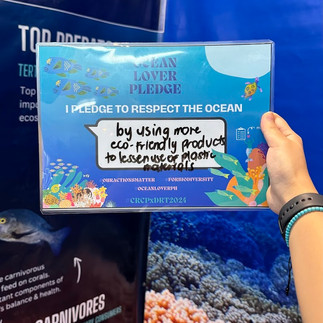















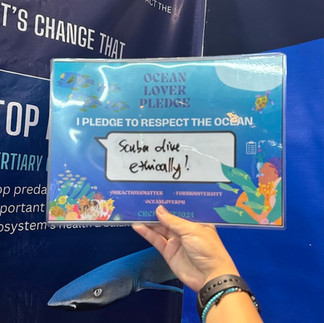



































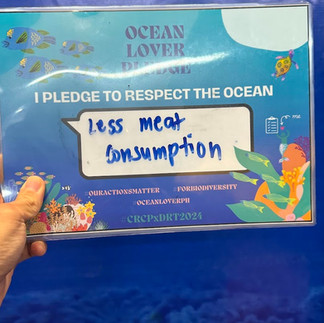

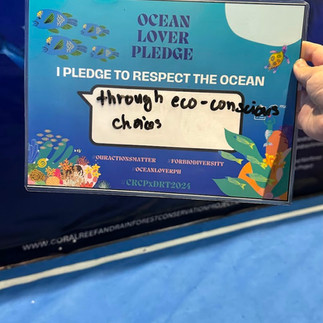

























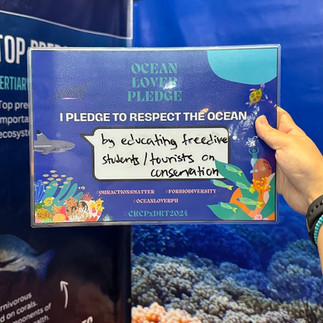










Comments